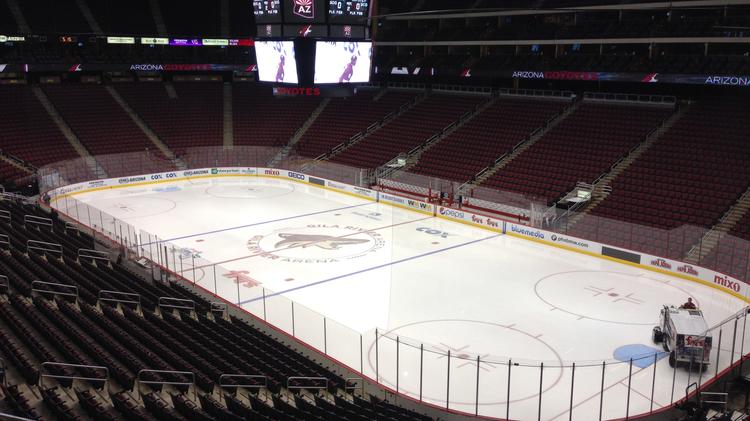Two years from now, the Arizona Coyotes and city of Glendale may again be butting heads over an arena deal, or the NHL team may be looking for a new home, whether it be in downtown Phoenix or another city such as Las Vegas, Seattle or Quebec City.
But maybe the compromise deal struck Thursday between the embattled Arizona city and hockey franchise will bring some mutual peace and benefits to both sides.
The new deal may not save hockey in the desert, but it’s better for Glendale and lets the Coyotes reap the rewards if they are able to increase revenue.
The Coyotes and Glendale buried their legal hatchet over the city tearing up a 2013 arena deal over a conflict of interest claim centered around former city attorney Craig Tindall. He went to work for the Coyotes in 2013 as general counsel.
The two sides crafted a new two-year arena deal. The Glendale City Council will vote on the measure today.
Glendale was paying the Coyotes $15 million to “manage” the city-built Gila River Arena. The new deal has the city paying the NHL franchise $6.5 million, a much more realistic market rate for arena management.
The 2013 deal had the team sharing various revenue streams with the city to help offset the big annual payment. That revenue sharing goes away with the new deal. That means the Coyotes reap the benefits of bottom-line and marketing successes.
It also eliminates potential disputes with the city over whether the team is accurately sharing revenue.
At first glance, the new deal appears to ease financial burdens and pressures on Glendale.
The resolution gets rid of a 2018 out-clause the Coyotes had to get out of the previous 15-year deal if the team lost $50 million or more.
The Coyotes reported a $34.8 million loss in just the first year of the 2013 deal. Closing costs on the purchase of the team from the NHL and the buyout of a player contract helped propel those losses.
The new deal ends in 2017. The Coyotes owners could then again look at the future of the team in the West Valley and Phoenix market as a whole.
It was not clear what was going to happen with the legal fight over Glendale tearing up the 2013 deal over Tindall going to work for the team. The city’s argument looked to have at least some legs under state procurement rules related to conflicts of interest. There was little or no precedent on those cases involving a government executive going to work a private business who benefited from a contract.
Glendale pushed that issue in an effort to get the Coyotes to rework the 2013 deal, which essentially subsidized the purchase of the team.
© Phoenix Business Journal

